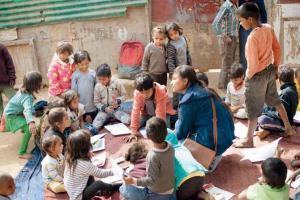Survey by Gurugram-based NGO reveals how over-worked and prejudiced teachers, with little training in disciplining kids, are nurturing an abusive environment in schools

NGO Agrasar has started holding awareness camps at government schools in Gurugram for teachers, schools as well as parents to create more awareness on corporal punishment. Pic/Agrasar
Eighteen years after a Supreme Court order banned corporal punishment in schools across India, a survey by Gurugram-based NGO Agrasar has revealed the shocking plight of underprivileged children in government schools, who continue to be at high risk of abuse at the hands of their teachers. With key findings such as lack of awareness regarding corporal punishment among teachers and parents, inadequate professional training in use of alternative methods, insufficient school governance and frustration among teachers, the research points out why physical assault and verbal harassment are normalised in government schools.
The survey titled, Choking Childhood: School Corporal Punishment, Everyday Violence Faced by Disadvantaged Children in India, will be released on November 20, observed globally as Universal Children's Day.
According to Agrasar, 521 children, between the age groups of six and 14 years, participated in the survey. The children hail from families with the income between Rs 4,000 and Rs 14,000 per month. Over and above this, the NGO has surveyed 100 parents, held three focus-group discussions with 29 parents, and semi-structured interviews with 40 children and 12 teachers from two government schools in Gurugram.

Prerit Rana, Agrasar CEO
Frustration and prejudice reign in schools
Agrasar, which works in the sector of education opportunities for underprivileged children, was introduced to the topic of corporal punishment through one of its students. "While there are so many organisations working in areas such as quality and reach of basic education, nobody is looking at the subtle nature of physical or mental abuse in schools. This led to the survey," explained Prerit Rana, co-founder and CEO of Agrasar.
Of the respondents surveyed, around 80 per cent spoke about being beaten up regularly at school. And, a shocking 71 per cent of them said that being beaten up for a reason was "okay".
Following the research, the NGO was able to offer a detailed explanation as to why corporal punishment is rampant in government schools. According to the findings, teachers in government schools have to engage in a number of activities that are unrelated to teaching, such as election duty, office admin and secretarial work, cleaning, maintenance work, etc. "They feel they are given insufficient financial support from the government and do not have enough time for teaching, which results in enormous frustration," the research pointed out.
This frustration, combined with a lack of professional and ethical conduct, which is fuelled by prejudice against children from poorer backgrounds, creates a toxic environment, causing teachers to vent their anger and act aggressively towards students. "Many children said that teachers punish them if they are in a bad mood and sometimes without any apparent reason," the research cited.
Incidentally, the research team from the NGO learnt that the teachers were well aware of the fact that corporal punishment was illegal, but overstepped the law, because they did not feel there was another way to discipline children.
Rana said that since a lot of issues are currently unresolved in government schools, corporal punishment is least of the authorities' concern. "More so, there is a major prejudice among teachers toward students from poor families. They feel that these children are going to replicate their parents' lifestyle in future and therefore, not worthy of education. This causes many teachers to act in a rude and dismissive way, which then translates into scolding and verbal harassment."
Parents from this demographic are also unaware of the fact that corporal punishment is wrong, because it is a prevailing practice in their households, Rana added. "With the prevailing thought that punishment is a must to discipline a child, there is a need for creating awareness regarding alternative measures. We have already started holdings awareness campaigns for teachers, schools and parents," he said, adding that a blanket ban is not always a fool-proof measure.
Mumbai children feeling the strain too
While this research is based on sample information collected from schools in Gurugram, Rana said that it is likely that students in government schools across the country are facing a similar predicament. "We have started a pan India research project on the same subject, which will take another year to publish, considering its vast nature," he said.
When Agrasar's survey was brought to the notice of school authorities and experts in Mumbai, the responses were similar. A teacher from a government school in Santacruz, on condition of anonymity, revealed that there have been several instances of teachers slapping or hitting kids. "Students don't talk about it, out of fear. Sometimes, parents themselves ask us to scold and beat their kids," the teacher said, adding, "Even though we have CCTVs, it does not cover the entire premises, hence, such cases go unnoticed by authorities."
Shyam Sonar, national executive of the All India Forum for Right To Education, which works towards education of children from underprivileged backgrounds, said, "In civic as well as government schools, corporal punishment is a rampant practice. Parents are least bothered due major unawareness. While we strongly condemn it, we also feel that this situation needs to be examined by the system to provide correct alternatives."
Sonar pointed out that at present, 30,000 posts of teachers are vacant in government schools in Maharashtra and the list of non-academic works allotted to teachers includes a total of 117 tasks. "With the skewed student-teacher ratio and immense burden of non-academic task, students in these schools are becoming easy target of teachers' frustration," said Sonar.
Prashant Redij, spokesperson of Maharashtra Principals' Association, echoed similar sentiments. "Teachers in government schools are overburdened with so many non-academic responsibilities. They barely get time to be good teachers." he said.
Anna Corea, principal of St Stanislaus School, said that only awareness can help. "Many of the teachers belong to a generation where child rights was not a burning issue. Considering this, it is important that teachers are imparted positive behavioural management skills."
Catch up on all the latest Mumbai news, crime news, current affairs, and also a complete guide on Mumbai from food to things to do and events across the city here. Also download the new mid-day Android and iOS apps to get latest updates
 Subscribe today by clicking the link and stay updated with the latest news!" Click here!
Subscribe today by clicking the link and stay updated with the latest news!" Click here!









